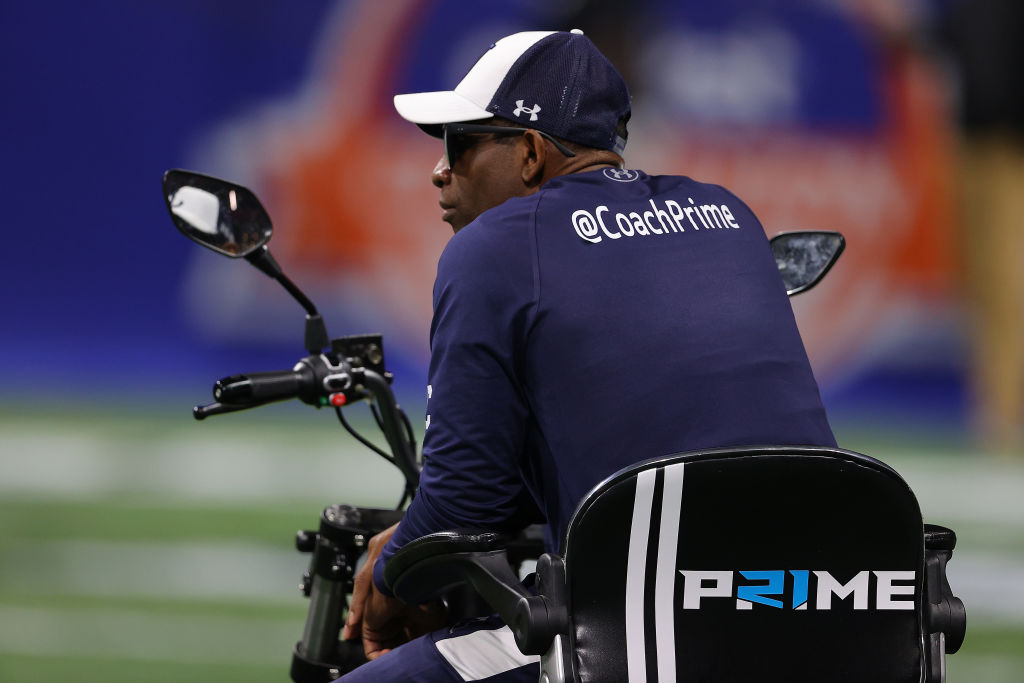OP-ED: Deion Sanders Is Wrong About ‘Payout Games For HBCUs
Head coach Deion Sanders of the Jackson State Tigers looks on during pregame warmups prior to facing the South Carolina State Bulldogs in the Cricket Celebration Bowl at Mercedes-Benz Stadium on December 18, 2021, in Atlanta, Georgia. | Source: Kevin C. Cox / Getty
HBCU football programs have always been one of the vital parts of the HBCU community.
But not many people truly know what it takes to put together a football season on the yard. Athletic programs at HBCUs are often cash-strapped and in a similar predicament to most other services on campus that need more funding.
So when Jackson State University Head Football Coach Deion Sanders challenges the long-standing practice of participating in “payout games”, questions will arise.
MORE: So Basically, Deion Sanders Thinks IG Model Brittany Renner Is A Gold Digger-Dodging Sensei
“Payout games” happen when smaller programs agree to play Power Five opponents such as Clemson or Alabama in exchange for a significant monetary payment to the smaller school. The smaller program usually receives a large sum and the larger school receives a chance to get an “easy” win.
These games have generated significant revenue for not only HBCU programs but also for smaller schools across the country. But Sanders isn’t a fan of them.
“The goal is to dominate where you are, not win, but to dominate where you are,” Sanders said on “The Rich Eisen Show” last week. “Then, you look towards down the line to scheduling some of those games. Right now, those games are a financial beatdown. That’s what I call them. That’s what some HBCUs choose to do. I’m going to go to these various schools, get my butt kicked, but I’m walking out of there with $750,000 or a million dollars. That’s not worth it to me. To me, that’s the ultimate sell-out to children.”
He added: “I know I’m not going to win, I’m going to lose three or four players to injury and you’re going to humiliate my team and I’m going to have to build them back up the next week to play again. That doesn’t make any sense to me.”
It’s the second time that Sanders has spoken about these games. He voiced his displeasure surrounding these “payout games” earlier this fall.
“All money ain’t good money,” he said during a conference call in September.
His comments sparked an interesting conversation about the place for these “payout games.” These games accomplish more than just getting a large paycheck — they also give the players a chance to compete in some of the largest venues in America and allow them to showcase their skills against some of the best players in the country. Many former HBCU players have increased their chances of getting drafted with good performances against these big-time schools.
While the “payout game” doesn’t make or break their NFL hopes, the opportunity to play against these Power Five schools does help HBCU standouts by giving NFL scouts a chance to see them against talent with similar measurables.
Now, this doesn’t mean that every HBCU football schedule maker should put an SEC or ACC opponent in every open weekend they have. Getting beat by 30 or more points and competing outside of your weight class gets old after a while.
But to say that this method “doesn’t make any sense” or that it’s “the ultimate sellout to children” is a very narrow-minded view on this topic.
Like everything in life, balance is key.
There’s nothing wrong with these HBCU programs chasing their paper. But that doesn’t mean we have to throw our athletes to the wolves, either.
Many HBCUs have already been able to find a nice sweet spot on this issue. Maybe Sanders should give them a call.
SEE ALSO:
Deion Sanders Leaving Jackson State Would Be A Big Blow, But HBCU Football Would Bounce Back
[ione_media_gallery id=”3903711″ overlay=”true”]

